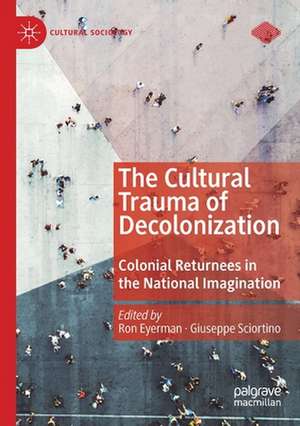The Cultural Trauma of Decolonization: Colonial Returnees in the National Imagination: Cultural Sociology
Editat de Ron Eyerman, Giuseppe Sciortinoen Limba Engleză Paperback – 9 ian 2021
| Toate formatele și edițiile | Preț | Express |
|---|---|---|
| Paperback (1) | 693.57 lei 6-8 săpt. | |
| Springer International Publishing – 9 ian 2021 | 693.57 lei 6-8 săpt. | |
| Hardback (1) | 697.97 lei 6-8 săpt. | |
| Springer International Publishing – 18 dec 2019 | 697.97 lei 6-8 săpt. |
Din seria Cultural Sociology
-
 Preț: 135.50 lei
Preț: 135.50 lei - 20%
 Preț: 690.92 lei
Preț: 690.92 lei - 20%
 Preț: 753.64 lei
Preț: 753.64 lei -
 Preț: 135.65 lei
Preț: 135.65 lei -
 Preț: 353.99 lei
Preț: 353.99 lei - 15%
 Preț: 587.20 lei
Preț: 587.20 lei - 15%
 Preț: 584.76 lei
Preț: 584.76 lei - 15%
 Preț: 579.52 lei
Preț: 579.52 lei -
 Preț: 167.36 lei
Preț: 167.36 lei -
 Preț: 381.43 lei
Preț: 381.43 lei - 18%
 Preț: 777.50 lei
Preț: 777.50 lei -
 Preț: 490.07 lei
Preț: 490.07 lei -
 Preț: 385.84 lei
Preț: 385.84 lei -
 Preț: 388.72 lei
Preț: 388.72 lei - 15%
 Preț: 579.84 lei
Preț: 579.84 lei - 15%
 Preț: 642.51 lei
Preț: 642.51 lei -
 Preț: 383.93 lei
Preț: 383.93 lei - 8%
 Preț: 587.77 lei
Preț: 587.77 lei -
 Preț: 382.36 lei
Preț: 382.36 lei -
 Preț: 385.25 lei
Preț: 385.25 lei -
 Preț: 268.08 lei
Preț: 268.08 lei - 15%
 Preț: 594.24 lei
Preț: 594.24 lei - 18%
 Preț: 734.90 lei
Preț: 734.90 lei - 15%
 Preț: 697.47 lei
Preț: 697.47 lei -
 Preț: 198.46 lei
Preț: 198.46 lei -
 Preț: 389.70 lei
Preț: 389.70 lei -
 Preț: 461.50 lei
Preț: 461.50 lei - 15%
 Preț: 699.93 lei
Preț: 699.93 lei - 15%
 Preț: 637.59 lei
Preț: 637.59 lei -
 Preț: 173.51 lei
Preț: 173.51 lei - 18%
 Preț: 906.33 lei
Preț: 906.33 lei
Preț: 693.57 lei
Preț vechi: 815.97 lei
-15% Nou
Puncte Express: 1040
Preț estimativ în valută:
132.73€ • 138.06$ • 109.58£
132.73€ • 138.06$ • 109.58£
Carte tipărită la comandă
Livrare economică 14-28 aprilie
Preluare comenzi: 021 569.72.76
Specificații
ISBN-13: 9783030270278
ISBN-10: 3030270270
Pagini: 231
Ilustrații: XV, 231 p. 1 illus.
Dimensiuni: 148 x 210 mm
Greutate: 0.33 kg
Ediția:1st ed. 2020
Editura: Springer International Publishing
Colecția Palgrave Macmillan
Seria Cultural Sociology
Locul publicării:Cham, Switzerland
ISBN-10: 3030270270
Pagini: 231
Ilustrații: XV, 231 p. 1 illus.
Dimensiuni: 148 x 210 mm
Greutate: 0.33 kg
Ediția:1st ed. 2020
Editura: Springer International Publishing
Colecția Palgrave Macmillan
Seria Cultural Sociology
Locul publicării:Cham, Switzerland
Cuprins
1. Introduction.- 2. Italian Decolonization: Multidirectional Migrations, Multidirectional Memories.- 3. Japanese Narratives of Decolonization and Repatriation from Manchuria.- 4. Trauma and the Last Dutch War in Indonesia, 1945-1949.- 5. Beyond the "Trauma": Legitimization and Revenge of the "Anciens du Congo".- 6. Pied-Noir Trauma and Identity in Postcolonial France, 1962-2010.- 7. Trauma and the Portuguese Repatriation: A Confined Collective Identity.- 8. Conclusion.
Notă biografică
Ron Eyerman is Emeritus Professor of Sociology at Yale University, USA, and affiliated with the Department of Sociology at the University of Lund, Sweden. He is the author of Memory, Trauma, and Identity (2019), Cultural Trauma (2001), and Music and Social Movements (1998), among many other titles. His interests include cultural and social movement theory, critical theory, cultural studies, and the sociology of the arts.
Giuseppe Sciortino is Professor of Sociology at the Università di Trento, Italy. He is the author of Rebus Immigrazione (2017) and the co-author of Great Minds: Encounters with Social Theory (2011, with G. Poggi). His interests include cultural sociology, social solidarity, and international migration studies.
Giuseppe Sciortino is Professor of Sociology at the Università di Trento, Italy. He is the author of Rebus Immigrazione (2017) and the co-author of Great Minds: Encounters with Social Theory (2011, with G. Poggi). His interests include cultural sociology, social solidarity, and international migration studies.
Textul de pe ultima copertă
This volume is first consistent effort to systematically analyze the features and consequences of colonial repatriation in comparative terms, examining the trajectories of returnees in six former colonial countries (Belgium, France, Italy, Japan, the Netherlands, and Portugal). Each contributor examines these cases through a shared cultural sociology frame, unifying the historical and sociological analyses carried out in the collection. More particularly, the book strengthens and improves one of the most important and popular current streams of cultural sociology, that of collective trauma. Using a comparative perspective to study the trajectories of similarly traumatized groups in different countries allows for not only a thick description of the return processes, but also a thick explanation of the mechanisms and factors shaping them. Learning from these various cases of colonial returnees, the authors have been able to develop a new theoretical framework that may help cultural sociologists to explain why seemingly similar claims of collective trauma and victimhood garner respect and recognition in certain contexts, but fail in others.
Caracteristici
Uses a comparative framework to understand colonial repatriation following traumatic forms of decolonization Contributes to theories of cultural sociology and collective trauma and memory Provides a new concept, accounting for “cultural opportunity structures,” to explore how popular understandings of collective trauma and victimhood develop
